‘Sovereign citizens’ fight UK Covid vaccine rollout
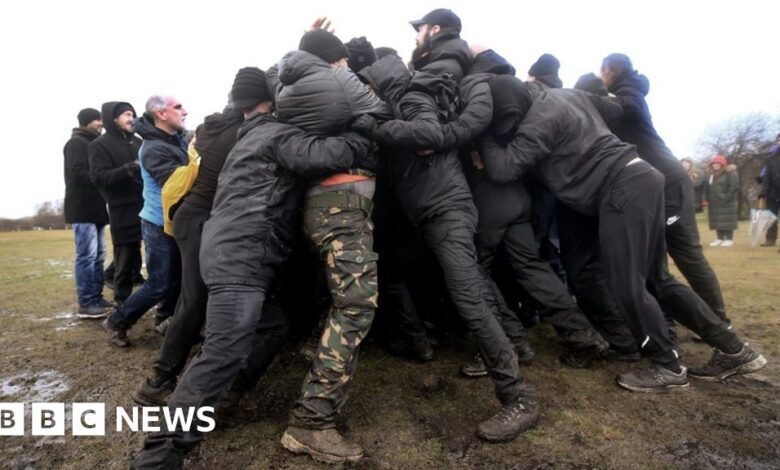
BBC Monitoring
 Getty Images
Getty ImagesOpposition to Covid vaccinations has come in many forms, but none stranger than the “sovereign citizen” defence.
It uses defunct ancient English law to try to challenge regulations.
Some anti-vaccination protesters outside schools and hospitals have used this to hand out fake legal documents to teachers, parents and health workers.
Others have sought to remove Covid patients from intensive care wards, citing non-existent “common law” empowering them to do so.
They also accuse the government of “vaccine genocide” in videos shared on social media.
Some groups have even held training camps for their members. Images have emerged of black-clad men being coached in “direct action” techniques.
No basis in law
Followers of “sovereign citizen” and “freeman on the land” conspiracy theories wrongly believe they possess the legal power to bring leading politicians, civil servants and scientists before so-called “common law courts”.
They allege “crimes” over Covid restrictions and vaccinations, even though such claims have no basis in law.
But that has not deterred a newly-formed group calling itself Alpha Men Assemble, which combines anti-vaccine and sovereign citizen beliefs.
 Getty Images
Getty ImagesLaunched on the Telegram chat app in mid-December, the group has amassed 8,000 members, and posts footage of training sessions online.
The group has described itself as “free thinking men and women living as sovereign beings under common law”. They say that they reject violence and are in favour of “body autonomy”.
Its training events, it says, are “non-combative and are in no way to be linked to any militia or extremism”.
We asked the Alpha Men Assemble group for comment, but have not yet received a response.
 TELEGRAM
TELEGRAMDirect action and threats
In December, two Covid patients were taken out of hospitals in Liverpool and Milton Keynes, against the advice of doctors and nurses.
Video of the incident in Liverpool’s Aintree University Hospital shows activists boasting of their presumed legal jurisdiction as “common law constables”. They told staff and police they were under “open arrest”. A man was later arrested in connection with the incident.
 FACEBOOK
FACEBOOKConspiracy-laden criminal complaints have recently been filed with police in the UK and also the International Criminal Court, alleging “genocide” and “depopulation” via vaccinations.
In August, a group attempted to “seize” Edinburgh Castle, claiming sovereignty over the landmark under Magna Carta. They told police they rejected “fake acts and statutes” that were “made up by paedophiles”. One person was arrested.
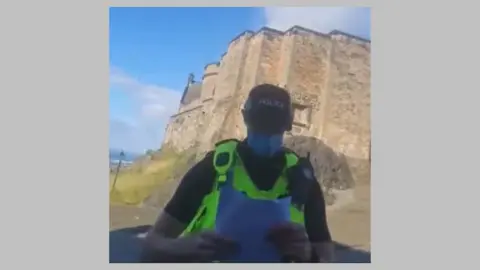 FACEBOOK
FACEBOOKWhat do sovereign citizens believe?
British believers think that they can opt out of laws with which they do not agree, based on a clause – or, as they term it, Article 61 – of Magna Carta.
 Getty Images
Getty ImagesUK sovereign citizen activists often cite obscure terms such as “legal name fraud” and “wet signatures”, and organise on social media.
Volunteers are encouraged to attend training to qualify as “common law constables”, which they falsely believe grants powers akin to, or even higher than, the police.
Activists believe that government-issued documents such as birth certificates and driving licences are “legal fictions”.
An online “common law court” allows followers to register as “living men and women”. It also hands out identification documents to volunteers and provides so-called legal advice and services, for a range of fees.
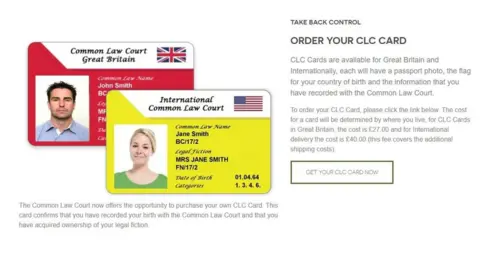 COMMONLAWCOURT
COMMONLAWCOURT“There is no such concept in our law as a sovereign citizen,” said the Law Society’s Ellie Cumbo.
Some followers have learned this the hard way, finding out in court that their beliefs don’t form a legal defence from criminal charges.
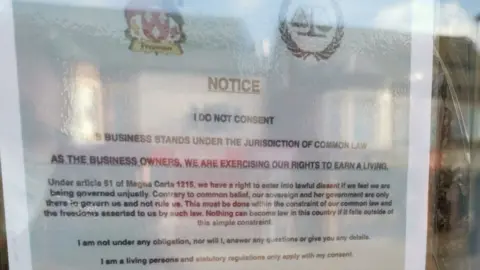
What do the ‘writs’ contain?
They urge “all constables and sovereign men and women” to arrest these figures “on sight and without delay”.
One sent to the BBC’s disinformation reporter Marianna Spring said she was being served with a “notice of liability for harm and death”.
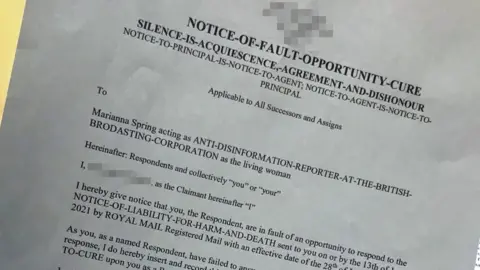
Ms Cumbo said: “These bogus writs have no legal validity, and in many cases do not even seem to involve or resemble a claim that would be recognised by the courts.
“Historically, writs were used to start any civil claim against someone else, but today this has to be done via a claim form issued under the authority of the relevant court.”
Source link





